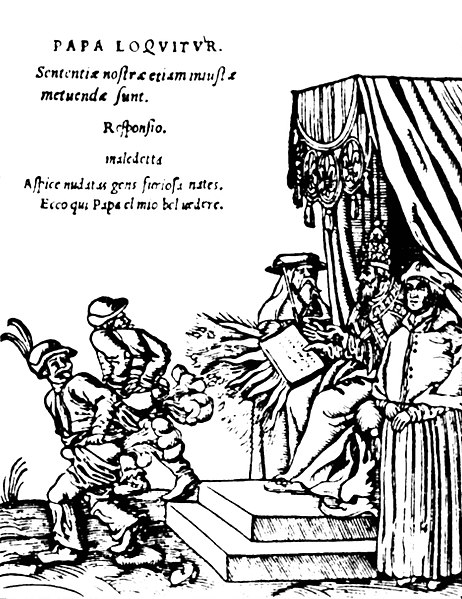Anti-Irish sentiment includes oppression, persecution, discrimination, or hatred of Irish people as an ethnic group and/or a nation. In general, it can be directed against the island of Ireland, or in particular, it can be directed against Irish immigrants and their descendants in the Irish diaspora. This sentiment is also called Hibernophobia.
American political cartoon by Thomas Nast titled "The Usual Irish Way of Doing Things", depicting a drunken Irishman sitting on a barrel of gunpowder while lighting a powder keg and swinging a bottle in the air. Published 2 September 1871 in Harper's Weekly
An Irishman depicted as a gorilla ("Mr. G. O'Rilla")
London version of NINA song, Feb. 1862
1862 song that used the "No Irish Need Apply" slogan. It was copied from a similar London song.
Anti-Catholicism is hostility towards Catholics and opposition to the Catholic Church, its clergy, and its adherents. At various points after the Reformation, some majority-Protestant states, including England, Northern Ireland, Prussia, Scotland, and the United States, turned anti-Catholicism, opposition to the authority of Catholic clergy (anti-clericalism), opposition to the authority of the pope (anti-papalism), mockery of Catholic rituals, and opposition to Catholic adherents into major political themes and policies of religious discrimination and religious persecution. Major examples of groups that have targeted Catholics in recent history include Ulster loyalists in Northern Ireland during the Troubles and the second Ku Klux Klan in the United States. The anti-Catholic sentiment which resulted from this trend frequently led to religious discrimination against Catholic communities and individuals and it occasionally led to the religious persecution of them. Historian John Wolffe identifies four types of anti-Catholicism: constitutional-national, theological, popular and socio-cultural.

A famous 1876 editorial cartoon by Thomas Nast, an immigrant from Germany who had been raised as a Catholic. It portrays bishops as crocodiles who are attacking public schools, with the connivance of Irish Catholic politicians.
From a series of woodcuts (1545) usually referred to as the Papstspotbilder or Papstspottbilder, by Lucas Cranach, commissioned by Martin Luther. "Kissing the Pope's feet"; German peasants respond to a papal bull of Pope Paul III. Caption reads: "Don't frighten us Pope, with your ban, and don't be such a furious man. Otherwise we shall turn around and show you our rears".
Passional Christi und Antichristi, by Lucas Cranach the Elder, from Luther's 1521 Passionary of the Christ and Antichrist. The Pope as the Antichrist, signing and selling indulgences.
Foxe's Book of Martyrs glorified Protestant martyrs and shaped a lasting negative image of Catholicism in Britain.








